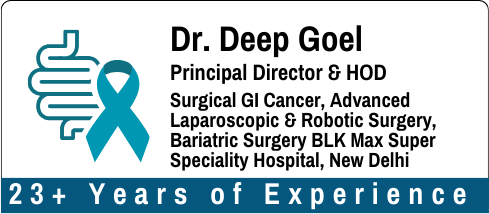What Are the Different Surgical Options for Colon Cancer?

Colon cancer, a formidable adversary in the landscape of oncology, has seen a steady rise in incidence over the years. According to the World Health Organization (WHO), it ranks as the third most common cancer globally.
This statistic underscores the importance of understanding this disease, especially its various treatment options. While colon cancer symptoms may range from abdominal pain to changes in bowel habits, early detection and appropriate surgical intervention can significantly improve survival rates.
With advances in medical technology and techniques, surgical options for colon cancer have evolved, offering hope to patients. Dr. Deep Goel, a leading expert in colorectal surgery, emphasises the importance of individualised treatment plans: “Every patient is unique, and understanding their specific condition is crucial in determining the best surgical approach.”
This blog will explore the different surgical options available for colon cancer, helping patients and their families navigate this challenging journey.
What Are the First Signs of Having Colon Cancer?
Understanding the first signs of colon cancer can make a significant difference in outcomes. Common symptoms include:
- Blood in the stool
- Unexplained weight loss
- Persistent abdominal discomfort
- Changes in bowel habits, such as diarrhoea or constipation
It’s essential to recognise these signs early and consult a healthcare provider for appropriate evaluation. According to Dr. Goel, “Awareness of the symptoms can lead to early diagnosis, which is critical for effective treatment.”
What Are the Causes of Colon Cancer?
The exact colon cancer causes are still being studied, but several risk factors have been identified:
- Age: The risk increases significantly after age 50.
- Family History: A personal or family history of colon cancer or polyps can elevate risk.
- Lifestyle Factors: Obesity, a sedentary lifestyle, smoking, and excessive alcohol consumption are linked to higher risk.
- Diet: High consumption of red or processed meats and low fibre intake may contribute to colon cancer development.
Understanding these risk factors can help individuals make informed lifestyle choices that may lower their chances of developing colon cancer.
What Are the Types of Colon Cancer Surgery?
When it comes to colon cancer surgery types, several options are available, depending on the stage and location of the cancer. Understanding these procedures can empower patients to make informed decisions about their treatment. Here’s a breakdown of the most common surgical procedures:
Partial Colectomy
A partial colectomy involves removing the cancerous section of the colon along with a margin of healthy tissue. This is often the first line of treatment for localised colon cancer. Dr. Deep Goel states, “This approach not only targets the tumour effectively but also preserves as much of the healthy colon as possible, which is essential for maintaining bowel function.”
Total Colectomy
In cases where cancer is more widespread, a total colectomy may be necessary. This procedure entails removing the entire colon. While it is more extensive than a partial colectomy, it may be the best option for patients with significant tumour involvement or multiple tumours.
Laparoscopic Surgery
Minimally invasive laparoscopic surgery is an advanced technique that utilises small incisions and specialised instruments. This method results in less pain, shorter recovery times, and reduced scarring. Dr. Goel emphasises the benefits, saying, “Laparoscopic surgery has revolutionised how we treat colon cancer. Patients can often return to their normal activities much sooner, which significantly enhances their quality of life.”
Robotic Surgery
Robotic-assisted surgery offers enhanced precision and control during the procedure. Surgeons can perform complex manoeuvres that may not be possible with traditional techniques. This innovative method promotes quicker recovery and allows for more accurate removal of cancerous tissue, minimising damage to surrounding healthy tissues.
Colostomy
In some instances, a colostomy may be necessary if the cancer obstructs the colon. This involves creating an opening in the abdomen for waste elimination. While it may seem daunting, many patients successfully adapt to living with a colostomy.
Rajesh, a colon cancer survivor, shared his experience with Dr. Goel: “I was terrified when I was diagnosed with colon cancer. The fear of the unknown was overwhelming. However, Dr. Goel explained everything clearly and helped me choose the right surgical option for my situation. He recommended a partial colectomy, which allowed me to keep most of my colon. Today, I feel stronger than ever, and I’m truly grateful for his support and guidance throughout my treatment.”
Similarly, Anita, who underwent laparoscopic surgery, expressed her relief and satisfaction: “Choosing laparoscopic surgery was the best decision I made. I was initially worried about the procedure, but Dr. Goel’s approach made me feel confident. The recovery was quick, and I was back to my daily routine within weeks. His compassionate care and expertise made all the difference in my journey. I can’t thank him enough for his support.”
What Is the Cost of Colon Cancer Surgery?
In India, the cost of colon cancer surgery typically ranges from INR 3,00,000 to INR 10,00,000 (approximately 3,600 to 12,000 USD). This average can vary based on factors such as the type of surgery, the hospital’s location, and whether the procedure is performed on an inpatient or outpatient basis.
Patients must consult with their healthcare providers and insurance companies to understand coverage options and obtain detailed estimates tailored to their specific situation.
Conclusion
Understanding the different surgical options for colon cancer is vital for making informed decisions about treatment. Each patient’s journey is unique, and choosing the right surgical approach can lead to successful outcomes.
By recognising colon cancer symptoms, understanding the causes, and exploring the various colon cancer surgery types, patients can confidently navigate this challenging path. As Dr. Goel beautifully puts it, “Knowledge is power, and being well-informed can help you take control of your health.”
If you or someone you know is facing colon cancer, seeking expert advice is crucial. The journey may be challenging, but with the right support and treatment, a brighter future awaits.
FAQs
Can colon cancer be prevented?
While it cannot be entirely prevented, maintaining a healthy lifestyle can lower the risk.
How often should I get screened for colon cancer?
Screening is recommended starting at age 45 or earlier if you have risk factors.
What is the survival rate for colon cancer?
The five-year survival rate varies by stage but is around 90% for early-stage diagnosis.
What lifestyle changes can help reduce the risk of colon cancer?
Eating a balanced diet, exercising regularly, and avoiding tobacco can help reduce risk.
Is chemotherapy necessary after colon cancer surgery?
Chemotherapy may be recommended based on the stage and characteristics of the cancer.
Explore more blogs: Is Stage 4 Colon Cancer Curable?

